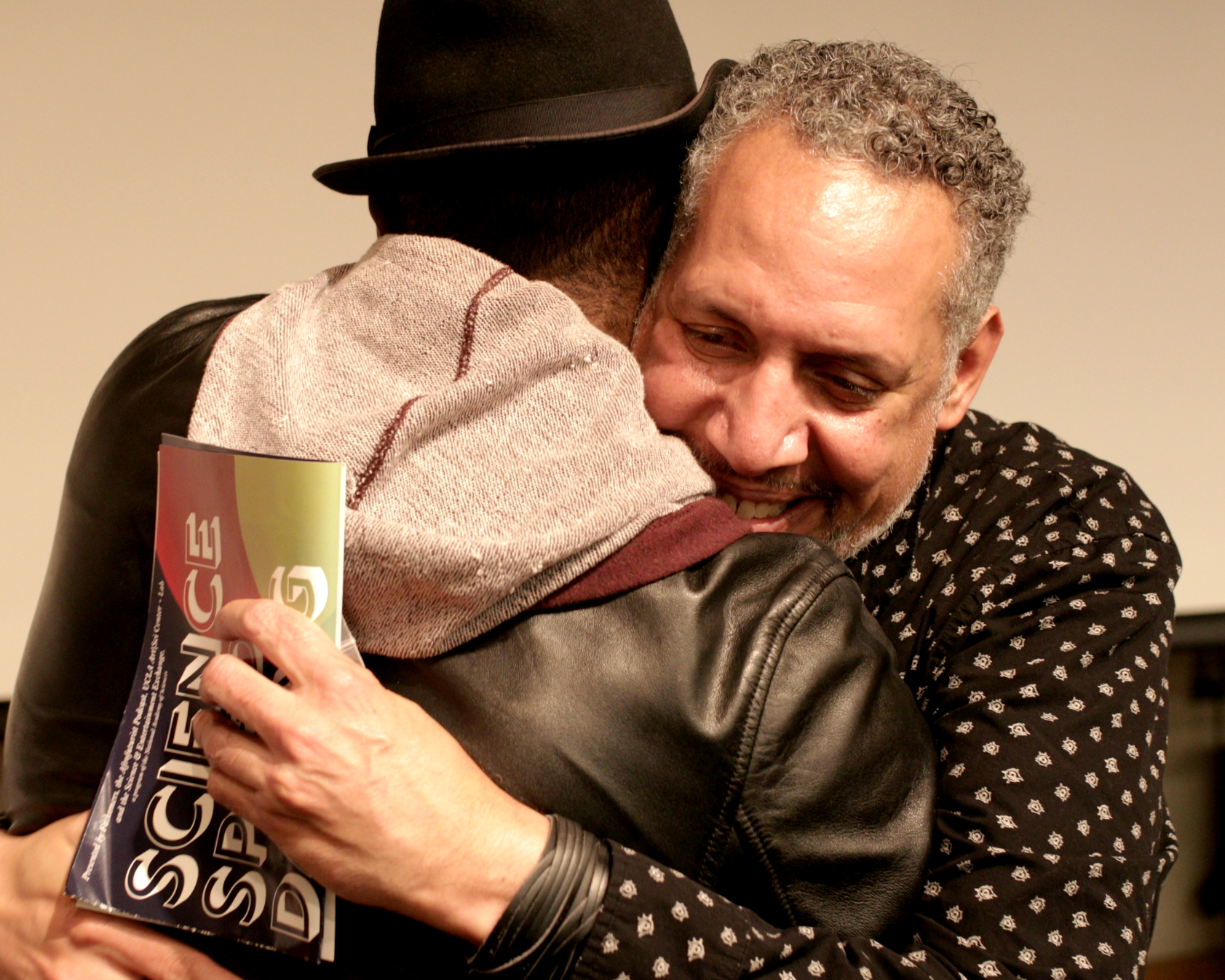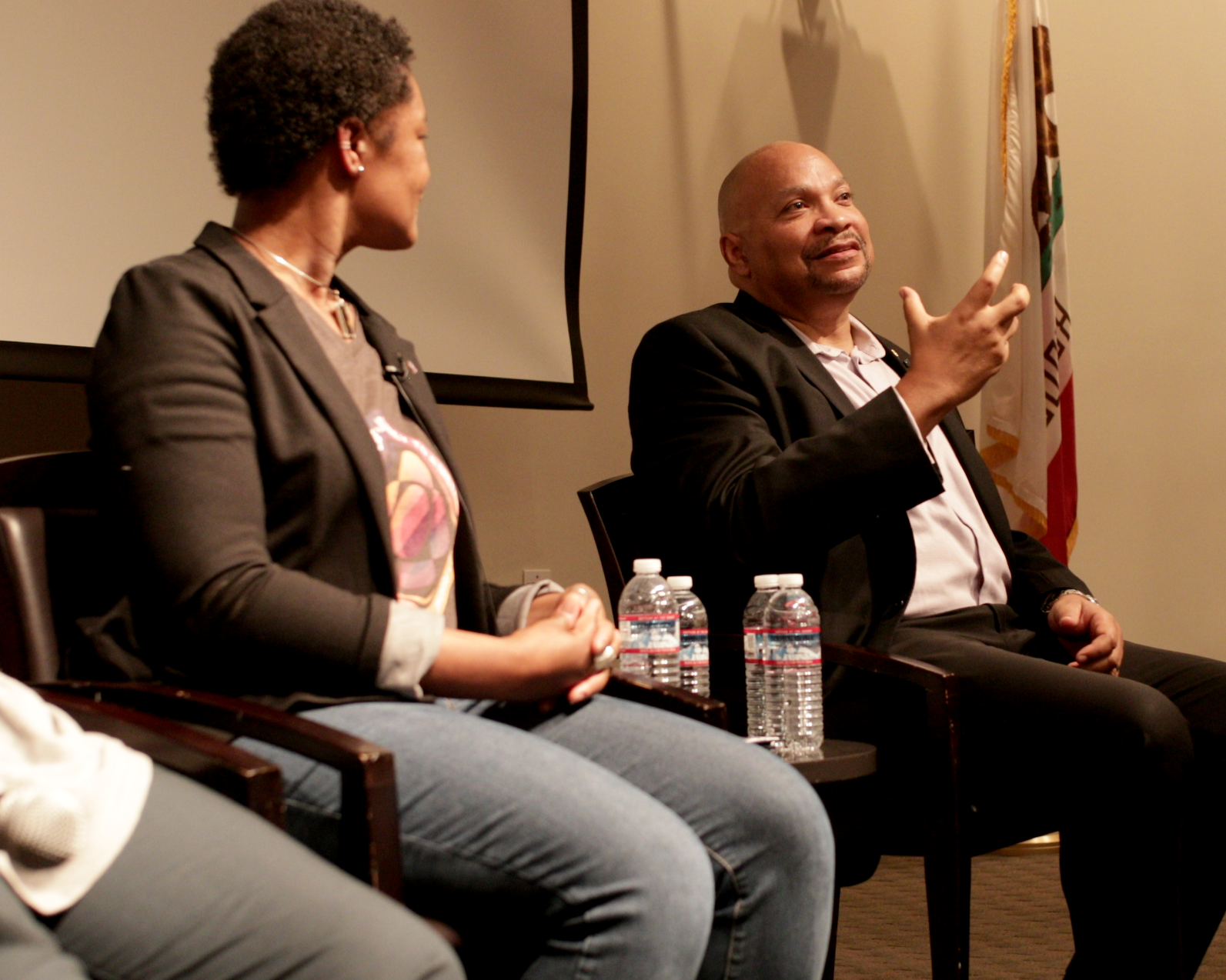SCIENCE SPEED DATING
Thursday, November 21, 2019
7:30 p.m. (doors at 7)
CSNI building at UCLA
570 Westwood Plaza, Building 114
(watch the video here!)
A visiting assistant professor in theological studies at Loyola Marymount University, Philip Butler has research interests in neuroscience, technology, spirituality and race, which converge in his considerations of the future of Black AI. (photo: Lance Williams)
“Science Speed Dating” offered a night of exploration, curiosity, and innovation in a series of 7-minute presentations by leading scientists in a range of fields. Featuring an all-Black panel, the event was dedicated to bringing the research of individuals underrepresented in the sciences to the forefront and allowing for Black and Brown communities to be involved in discussions surrounding a positive future that included their experiences.
Presenters included communication and games researcher Lonny J. Avi Brooks, AI researcher Philip Butler, aerospace systems engineer Tracy Drain, oceanographer Bethanie Edwards, robotics engineer Maynard Holliday, and theoretical physicist Clifford Johnson.
Following the presentations, Ahmed Best, host of the Afrofuturist Podcast, moderated a Q&A with the speakers on the implications of their work to the shared experience of Black and Brown communities.
Fathomers was pleased to co-present Science Speed Dating, an event conceived and presented regularly by the Science & Entertainment Exchange (a program of the National Academy of Sciences), for the second time. This episode of “Science Speed Dating” was co-produced with the Afrofuturist Podcast and made possible with additional support from the California NanoSystems Institute and UCLA Art|Sci Center.
ABOUT THE PRESENTERS
UCLA alumnus Lonny J. Avi Brooks is an associate professor of strategic communication and media studies at California State University, East Bay, where he has piloted the integration of futures thinking into the communication curriculum for the last 15 years. He contributes prolifically to journals, conferences, and anthologies on subjects related to Afrofuturism and forecasting. Most recently, he published “Diverse Alternative Learning Visions 2026-2066: Transforming and Reframing the University as a Lifelong Social Design Lab,” co-written with colleague Ian Pollock, in Futures Thinking and Organizational Policy: Case Studies for Managing Rapid Change in Technology, Globalization, and Workforce Diversity. He is also lead co-editor of a Journal of Futures Studies special issue, titled “When Is Wakanda: Afrofuturism and Dark Speculative Futurism,” forthcoming in November 2019.
Brooks is co-executive producer and co-creator, with Ahmed Best, of the Afrofuturist Podcast; lead organizer and advisory board member for the Black Speculative Arts Movement (BSAM), in Oakland; and principal leader for BSAM Futures, which aims to publish comprehensive, inclusive and collaborative analyses of contemporary Afrocentric works. He also volunteers as a core member for outreach at Dynamicland.org, a pioneering non-profit dedicated to creating a more collaborative and dynamic computational medium for the long term.
Philip Butler is a visiting assistant professor in the Theological Studies Department at Loyola Marymount University in Los Angeles, California. His work primarily focuses on the intersection of neuroscience, technology, spirituality and race. His is the author of Making Enhancement Equitable: A Racial Analysis of the Term “Human Animal” and the Inclusion of Black Bodies in Human Enhancement. His forthcoming book project, titled Black Transhuman Liberation Theology, imagines what might happen when Black people utilize technological advancements to enhance both Black spiritualities and Black bodies in the struggle of materializing liberating realities. Currently, he is working to construct a Black posthumanism that is both critical and speculative in nature. It explores the future implications of Black embodiment and power dynamics associated with potential iterations of the global x-cene. He is also actively constructing the first Black conversation artificial intelligence agent (Seekr) with mental health capabilities.
Tracy Drain is a Systems Engineer working at NASA’s Jet Propulsion Laboratory. Her passion for space grew from an early love of science fiction – she soaked up Star Trek, Star Wars, Battlestar Galactica, and sci-fi books by the armload. She earned degrees in Mechanical Engineering at the University of Kentucky and Georgia Tech, and was hired at JPL in 2000. In her 19 years at the lab, she participated in the development and operation of the Mars Reconnaissance Orbiter (a science/relay orbiter at Mars), the Kepler mission (an exoplanet hunter) and the Juno mission (an orbiter at Jupiter). She is now the Deputy Project System Engineer for the Psyche mission, slated to launch in 2022 to explore what may be the largest metal asteroid in our solar system. Drain relishes being on the forefront of space exploration and loves sharing her passion for space with people of all ages.
Bethanie Edwards is a professor at UC-Berkeley and a sea-going oceanographer who hails from rural Arkansas. She is deeply interested in how marine microbes interact with one another, the chemical language that they use to do so, and the impact this has on ocean chemistry and climate. Since the industrial revolution, the ocean has absorbed ~40% of the CO2 that we’ve put into the atmosphere. This process is primarily driven by microscopic phytoplankton and the bacteria, viruses, and zooplankton grazers that use them as an energy source. Dr. Edwards’ expertise is in lipidomics, which allows her to listen in on their molecular conversations and gain insight into the complex web of microbial interactions. She is also an advocate for intersectionality in STEM, serving on the Board of Directors for the Society for Women in Marine Science and as a member of The Oceanography Society’s Ethics Committee.
Maynard Holliday is an award-winning engineer currently at the RAND Corporation in the SF Bay Area. He has worked as a senior engineering and robotics professional in government and the private sector. Holliday was an Obama Presidential Appointee and Senior Technical Advisor to Undersecretary of Defense for Acquisition Technology and Logistics at the Pentagon. He has led national security projects in Ukraine where he assembled and led a team that designed and fabricated a radiation hardened telerobotic mobile vehicle for site characterization and remediation tasks at Chernobyl unit 4 and led teams for the U.S./Russia Nuclear Material Security Task Force. He was a two-time finalist for the U.S. Astronaut Corp. and has been working with Bay Area public schools teaching robotics through the Citizen Schools program in East Oakland. He was named Citizen Schools Volunteer of the Year for 2012. He holds engineering degrees from Carnegie Mellon and Stanford universities.
Clifford Johnson's award-winning work in science ranges from teaching and research into black holes, particle physics, string theory, and cosmology, to public outreach where he strives to put science back into the general culture. He helps artists, writers, and filmmakers incorporate science into their work, and appears on several TV and online shows. He has been a science advisor for many TV shows and movies, including Nat Geo’s Genius (featuring Einstein), Marvel’s Agent Carter, Thor: Ragnarok, Avengers: Infinity War & Endgame, and more. Johnson also writes about science, and dabbles in art and music as time permits. He has written and drawn a graphic novel featuring science called The Dialogues, published by MIT Press in North America in November 2017, and in the UK in January 2018.
Ahmed Best is a senior fellow at the Annenberg Innovation Lab at USC; host of the Afrofuturist Podcast; CEO of BISN Media; and a writer, director, producer, actor, musician, and futurist. A founding member of the acid jazz group the Jazzhole, in New York, he starred in the Broadway musical Stomp and as the first CGI lead character in a motion picture, as Jar Jar Binks in the Star Wars prequel trilogy: The Phantom Menace, Attack of the Clones, and Revenge of the Sith.
Best is an MFA graduate of the American Film Institute and has received honors including an Ovation Award, an LACC Award, a Stage Raw Award, and an ANNIE award. He is executive producer of Dinner at LOLA (Stop That Bangin Productions/BISN Media) and The DL Chronicles (GLAAD Award winner for Best Miniseries), as well as creator, writer, and director of science-fiction comedy The Nebula.
ABOUT THE CO-PRESENTERS
Fathomers is a creative research institute dedicated to producing sites and encounters that challenge us to live and act differently in the world. We cultivate the ideas of diehard dreamers, commission projects that seem far-fetched, and enlist expansive thinkers across disciplines to redefine the limits of scale, scope and support for artist-led projects.
The Science & Entertainment Exchange, a program of the National Academy of Sciences, connects entertainment industry professionals with top scientists from across the country to create a synergy between accurate science and engaging entertainment.
Chartered by Congress in 1863 under an Act signed by Abraham Lincoln to provide crucial scientific advice to the nation, the National Academy of Sciences, a private, nonprofit institution, is uniquely positioned to draw on the expertise of thousands of men and women who have distinguished themselves in their respective fields in science.
The mission of the California NanoSystems Institute at UCLA is to leverage public and private investment for nanoscience research at the interfaces between disciplines, translate discoveries into knowledge-driven commercial enterprises, and educate the next generation of scientists and engineers.
The UCLA Art|Sci Center is dedicated to pursuing and promoting the evolving “Third Culture” by facilitating the infinite potential of collaborations between (media) arts and (bio/nano) sciences.
Through the UCLA School of the Arts and Architecture’s Design Media Arts Department and the California NanoSystems Institute (CNSI), the center supports visiting research scholars and artists-in-residence from around the world.
DOCUMENTATION
(Photo: Lance Williams)









